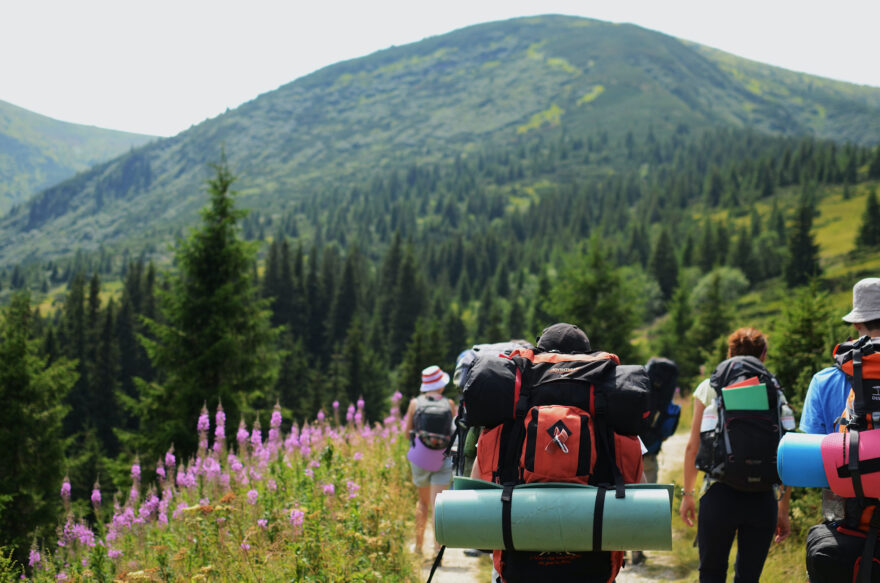
Image by Dmytro Matsiuk, Unsplash
As a teen, I credited the therapy with reversing the downward spiral I was on. But in college, the nightmares began.
This article was written by Katherine Gibbons for Undark, a non-profit, editorially independent digital magazine exploring the intersection of science and society.
The nightmares and flashbacks did not start until two years after I left Evoke Cascades. I was just 17 when I was taken there against my will. Located in a secluded desert near Bend, Oregon, Evoke Cascades was part of the lucrative for-profit industry of wilderness therapy programs for adolescents. Like similar programs, it operated on the premise that kids who are struggling with self-medicating or self-destructive behaviors, as I was, are best treated by removing them from familiar environments — and from civilization altogether.
The living conditions were treacherous; the physical demands were harsh. I often had to endure frigid and freezing temperatures with only a thin tarp as my shelter. For the 13 weeks I was there, I had no access to the outside world, except through weekly letters from my parents. I felt abandoned, unwanted, and unloved, despite understanding that my parents had sent me there to try to help me. Like many other adolescents who get placed in these programs, I went straight from wilderness therapy — filthy and exhausted — into seven months of therapeutic boarding school, further extending my isolation from friends and family.
For a time, I repressed these memories. I returned home to the Chicago suburbs, finished my senior year in high school, and earned admission to my dream university, a highly regarded Catholic school. In a 2020 story in Undark magazine, I attested that wilderness therapy had helped me overcome my self-medicating coping mechanisms and renew my focus on myself and academics.

Katherine Gibbons
Then, in my freshman year of college, the flashbacks started. Deep rooted anxieties surfaced. In time, I came to realize that the wilderness therapy I had credited with reversing my downward spiral had, in actuality, traumatized me.
I’m not alone. Dozens of wilderness therapy programs currently operate in the U.S. Collectively, according to the American Bar Association, the troubled teen industry — including therapeutic boarding schools, residential treatment centers, boot camps, and correctional facilities — treats between 120,000 and 200,000 adolescents each year, some 50,000 of whom were sent privately by their parents. There is little scientific evidence that wilderness therapy is effective, and many such programs have faced lawsuits alleging abuse, improper treatment of adolescents, and wrongful death. Many of them have permanently closed. Yet, wilderness therapy remains a thriving industry and parents frequently pay $16,000 or more per month in fees.
In time, I came to realize that the wilderness therapy I had credited with reversing my downward spiral had, in actuality, traumatized me.
Many of the young people who graduate from these programs, however, report lasting trauma. In recent stories by The Guardian, USA Today, and other outlets, survivors of wilderness therapy have described experiencing symptoms of post-traumatic stress disorder, or PTSD, that were triggered by their experiences.
My own symptoms surfaced in the form of unwanted memories of my abrupt transportation to Evoke Cascades — of waking up in a tiny motel room with two strangers and fearing I’d been kidnapped into a human trafficking scheme. Although I knew it was irrational, I felt during those flashbacks as if it could happen to me again. I relived the sense of abandonment I felt when I was there.
These anxieties grew worse each year around the anniversary of my exile to wilderness therapy. I began self-medicating to cope.
The Undark article I appeared in, and which I feel portrayed me in an unflattering light, did not help matters. Every time I thought of it, heard of it, or read about it, I felt traumatized anew.
Eventually, I realized that my anxieties weren’t going away, and that I couldn’t manage them on my own. I withdrew from school to attend a trauma center, where medical professionals clinically diagnosed me with PTSD, which they determined was rooted in my experience at Evoke Cascades. Using brain mapping, they detected signatures of trauma in my occipital and temporal lobes. Now, I have clinical and scientific evidence that wilderness therapy traumatized me.
The troubled teen industry — including therapeutic boarding schools, residential treatment centers, boot camps, and correctional facilities — treats between 120,000 and 200,000 adolescents each year.
But the trauma center also equipped me with tools to help me manage my PTSD. I have used neurofeedback therapy to learn to better control my brain functions, and Accelerated Resolution Therapy has helped me regulate my responses to emotional triggers. I also exercise more — the endorphins help to improve my mood, thoughts, and feelings. Through trauma-informed therapy, I’ve healed, gained friendships and self-insight, and acquired a sense of self-love that has allowed me to return to school and succeed.
About two years after I left Evoke Cascades, the program closed and was folded into another Evoke branch. But, almost certainly, it continues to exact a mental health toll on many of the young people who were sent there, traumatized, and kept there against their will. I am lucky: I found resources that made me feel both physically and mentally well. Others may not be as fortunate.
And so I stand with the public figures, non-profit organizations, and survivors who have called to reform the “troubled teen” industry and to investigate the allegations of abuse and neglect that swirl around it. Yes, wilderness therapy might have helped me temporarily shed certain self-destructive behaviors. However, it was not worth the lasting trauma.
Katherine Gibbons is a 21 year-old psychology student advocating for reform of the wilderness therapy industry.
 Your Privacy Choices
Your Privacy Choices